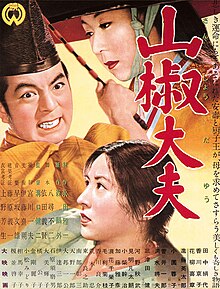Our website is made possible by displaying online advertisements to our visitors.
Please consider supporting us by disabling your ad blocker.
Sansho the Bailiff
| Sansho the Bailiff | |
|---|---|
 Theatrical release poster | |
| Directed by | Kenji Mizoguchi |
| Screenplay by | Fuji Yahiro Yoshikata Yoda |
| Based on | "Sansho the Bailiff" by Mori Ōgai |
| Produced by | Masaichi Nagata |
| Starring | Kinuyo Tanaka Yoshiaki Hanayagi Kyōko Kagawa Eitarō Shindō |
| Cinematography | Kazuo Miyagawa |
| Edited by | Mitsuzo Miyata |
| Music by | Fumio Hayasaka Tamekichi Mochizuki Kinshichi Kodera |
| Distributed by | Daiei Film |
Release date |
|
Running time | 124 minutes |
| Country | Japan |
| Language | Japanese |
Sansho the Bailiff (Japanese: 山椒大夫, Hepburn: Sanshō Dayū, known by its Japanese title in the United Kingdom and Ireland[1]) is a 1954 Japanese period film directed by Kenji Mizoguchi based on a 1915 short story of the same name by Mori Ōgai (translated as "Sanshō the Steward" in English), which in turn was based on a sekkyō-bushi (oral lore) appearing in written form in the 17th century.[2][3] It follows two aristocratic children who are sold into slavery.
Sansho the Bailiff bears many of Mizoguchi's hallmarks, such as portrayals of poverty and elaborately choreographed long takes. Today, the film is often ranked alongside Ugetsu (1953) as one of Mizoguchi's finest works.[4]
- ^ "Sansho Dayu page on the online "Masters of Cinema" catalogue of the distributor". Eureka. Retrieved 16 January 2013.
- ^ Friedrich, Lee (2006-03-01). "In the Voice of a Modern-day Miko: Hiromi Itō's Retelling of the Sanshō Dayū Legend". Studies on Asia. 3 (3): 1–20.
- ^ "A Question for the Modern Age: Sansho the Steward : Opinion : Chuo Online : YOMIURI ONLINE". yab.yomiuri.co.jp. Retrieved 2023-09-16.
- ^ Le Fanu, Mark. "Sansho the Bailiff: The Lessons of Sansho". Currents. The Criterion Collection. Retrieved 12 October 2013.
Previous Page Next Page


